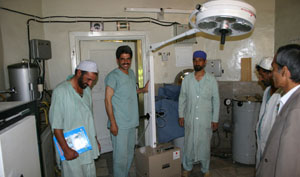|

|
JICA Program Evaluation: “Health Sector Program” in Afghanistan (2006-2007, JICA)
|

|
Keywords: Program Evaluation, Advantages of Organizational Capacity Development and Human Resources Development
After the collapse of the Taliban regime in 2001, Japan promptly held the Tokyo Conference on Afghanistan in 2002. With an initiative also adopted by the international community, assistance for a comprehensive peace process in Afghanistan was begun. Having been impacted even further after the war, the country had lost most of its social foundation, and was consequently referred to as a “post-devastation country.” JICA and its former President Ogata surveyed Afghanistan as a special envoy of the Japanese prime minister prior to the Tokyo Conference. Since then, the agency has placed emphasis on assistance in the health care field from the viewpoint of human security, and has dispatched many experts and implemented numerous technical cooperation projects.
This evaluation was conducted by JICA with the aim of reviewing cooperation project results in the health sector, extracting lessons-learned to contribute to future projects, and providing recommendations for the shape of future programs, taking new projects into consideration. For this, we dispatched team members to be in charge of program evaluation analysis and cooperation project results analysis. A unique aspect of the evaluation process was that instead of evaluating projects individually and compiling the results of each, all projects related to the Japanese health sector were strategically analyzed to determine the overall contribution of JICA projects to Afghanistan.
As a result, it was discovered the World Bank, EC, and major aid organizations such as USAID were working to expand health care services to serve issues quickly through NGOs over the entire region when they arise. In contrast, JICA was conducting assistance that focused on building organizational capacity and developing human resources to contribute to the Ministry of Health’s ownership and sustainability. The results of this evaluation were compiled as recommendations for program formation, and were used in making considerations for assistance in post-conflict nations.
|

|
